CIA Sponsored Terror, Civil Liberties, Civil Rights, Criminalizing Dissent, Extraordinary Rendition, Freedom Of Speech, Human Rights, Iraq War, Prosecution of the Bush Administration, Targeting Muslims, Torture, Violations of U.S. and International Law, War Resister, Whistleblowers
Podcast: Play in new window | Download


September 11, 2001: Lessons Learned And Overlooked
It has been 23 years ago this week since the attacks on September 11, 2001 in New York City, the Pentagon, and Shanksville, PA, killing nearly 3,000 people and injuring more than 6,000. On that day, the United States had a choice: The George W Bush administration could have treated the attacks as a violation of US and international law, launched a criminal investigation, and brought the perpetrators to justice in accordance with the rule of law. Instead, President Bush waged endless wars against Afghanistan and Iraq, pushed through Congress the USA Patriot Act, opened the notorious detention center at Guantanamo Bay which remain to this day, rounded up Muslims and South Asians for indefinite detention, initiated a wave of civil liberties and human rights violations, and committed wholesale torture against detainees and others.
To assess the legacy of 9/11 and the lessons learned and the lessons overlooked, we’ve invited someone who was at the center of Bush’s War on Terror. John Kiriakou is a journalist, former CIA counterterrorism officer, former senior investigator for the Senate Foreign Relations Committee, and former counterterrorism consultant for ABC News.
In 2007, Kiriakou blew the whistle on the CIA’s torture program, telling ABC News that the CIA tortured prisoners, that torture was official U.S. government policy, and that the policy had been approved by President George W. Bush. He knew what he was talking about. In 2002, he was responsible for the capture in Pakistan of Abu Zubaydah, then believed to be the third-ranking official in al-Qaeda.
He became the sixth whistleblower indicted by the Obama administration under the Espionage Act of 1917 — a law designed to punish spies. He served 23 months in prison as a result of his revelations.
In 2012, the Ralph Nader family honored Kiriakou with the Joe A. Callaway Award for Civic Courage, an award given to individuals who “advance truth and justice despite the personal risk it creates.” He won the PEN Center USA’s prestigious First Amendment Award in 2015, the first Blueprint International Whistleblowing Prize for Bravery and Integrity in the Public Interest in 2016, and also in 2016 the Sam Adams Award for Integrity in Intelligence, given by retired CIA, FBI, and NSA officers.
Guest – John Kiriakou is the author of eight books, including The Reluctant Spy: My Secret Life in the CIA’s War on Terror; and The CIA Insider’s Guide to the Iran Crisis. I met John in 2017 and we collaborated on companion reviews or the Los Angeles Review of Books of the book with the euphemisitic title Enhanced Interrogation written by James E. Mitchell and Bill Harlow, the architects of the American torture system.
—-


COP 29 Held In Azerbaijan Dictatorship
This year the UN Climate Conference — known as COP29 — will be hosted by the petrol-dictatorship of Azerbaijan. As COP29 delegates prepare to attend talks in Baku, the international community has a chance to shine a spotlight on Azerbaijan’s abysmal human rights record, notably the blockade and ethnic cleansing of Nagorno-Karabakh’s (Artsakh’s) Armenian population last year, and amid the government’s escalating domestic crackdown on freedom of speech, assembly and the press.
Ironically, Azerbaijan’s dictator Ilham Aliyev allocated $1 million to the UN Human Settlements Program, one day before a UN mission visited the Artsakh region who reported ‘no irregularities’ despite the territory being depopulated by Azerbaijan’s military invasion.
As one of the world’s top environmental and fossil fuel polluters, during its invasion of Nagorno-Karabakh, Azerbaijan used the outlawed, lethal and environmentally hazardous White Phosphorus as a chemical weapon on the native Armenian population and their highly forested environment. In that fatal siege, which liquidated all native Armenians, the Azeri government-sponsored blockaders posed as climate activists, while punishing true protesters of lethal pollution, in Azerbaijan, especially journalists and activists in advance of COP29.
Guest – Karnig Kerkonian, one of 23 legal advisors representing the Republic of Armenia at the ICJ (International Court of Justice) in 2021. Karnig’s team presented their case against Azerbaijan, calling on the Tribunal to take provisional measures “as a matter of extreme urgency” to “protect and preserve Armenia’s rights and the rights of Armenians from further harm.” Azerbaijan has ignored the ICJ’s November 2023 ruling to “take all necessary measures to prevent and punish acts of vandalism and desecration affecting Armenian cultural heritage, including but not limited to churches and other places of worship, monuments, landmarks, cemeteries and artifacts.” Attorney Kerkonian has also represented the Armenian community of Old Jerusalem in recent Israeli settler incursions upon the Armenian Quarter.

————————
CIA Sponsored Terror, Civil Liberties, Extraordinary Rendition, Human Rights, Targeting Muslims, U.S. Militarism, Violations of U.S. and International Law, War Resister
Podcast: Play in new window | Download
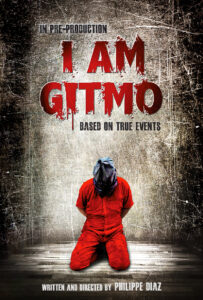
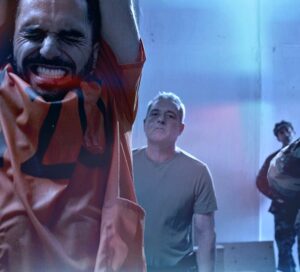
I Am Gitmo
It’s been 22 years since the United States opened its prison at the Guantanamo Bay Naval Base in Cuba. Specifically, it was four months after the September 11, 2001 attacks on the World Trade Center. And that was when we started seeing images of men and boys arriving there, bound and hooded, in orange jumpsuits, confined indefinitely without charges, legal process or trials…. And it was not long after that we began hearing reports that the US government was using torture, and even that prisoners were dying there – again, without even being charged with any crime let alone tried by any court.
The US justified its tactics as necessary to win the “War on Terror.” But UN Experts and human rights advocates globally have called for the US to close the facility due to its “unrelenting human rights violations.”
In 2009, President Obama took steps to close Guantanamo… but in 2018, Trump signed an executive order to keep it open. President Biden then came in, signaling he’d close it, but the subject has been largely ignored ever since. Today, thirty prisoners remain. Where To Watch I Am Gitmo In Theaters
Guest – Philippe Diaz, a filmmaker is shining a spotlight on the humanity of the men and boys who have lived – and some who have died – in Guantanamo. His latest film, the award-winning I Am Gitmo, is a story about a Muslim schoolteacher in Afghanistan who was accused of being involved in the September 11th attacks and imprisoned in Guantanamo Bay prison without charges or hope of being released. Philippe is not only the writer and director of I Am Gitmo, but he is also the founder of Cinema Libre Studio. CLS is a boutique film company created in 2003 with a consortium of partners to provide an alternative structure for intelligent, independent films to get developed, financed, produced and distributed.
—-
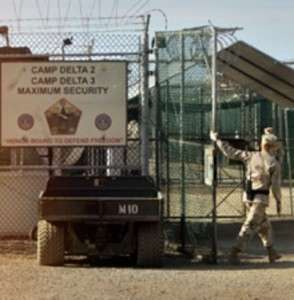
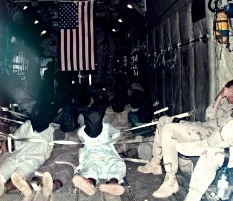
22 Years of Guantánamo Bay Detention Center
The notorious detention center at Guantanamo Bay is high among the most shameful steps taken during George W. Bush’s War on Terror. It remains a symbol of lawlessness and human rights abuses. In a recent letter, 17 US Senators, argued that the detention facility continues to harm U.S. national security by serving as a propaganda tool for America’s enemies and hinder counterterrorism efforts and cooperation with allies.
January 11 2024 marked the 22nd anniversary of Guantánamo’s opening. It has cost the United States $540 million each year. That’s almost a total of $12 billion and counting. There are now still 30 men remaining in detention at Guantánamo—more than half of whom have not been charged with any crime and have been approved by US national security leadership for transfer out of Guantánamo. Some of these men have been approved for transfer for years, and at least one has been approved for transfer for more than a decade, yet these 16 men have continued to languish in indefinite detention. None of the innocent detainees has ever been compensated for their wrongful detention. Sadly, Guantanamo is but one example of the forms of torture which the United States engages in and supports.
Guest – Rev. Ron Stief, an ordained minister in the United Church of Christ, who is the Executive Director of the National Religious Campaign Against Torture (NRCAT), an interfaith organization of more than 325 religious organizations committed to ending U.S.-sponsored torture. Rev. Stief sits on the Steering Committee of Shoulder to Shoulder / Standing with American Muslims Upholding American Values, co-leads the national advocacy strategy of the Washington DC Interreligious Staff Community, and is a member of the Federal Anti-Solitary Task Force which works to end solitary confinement in federal prisons, jails and immigrant detention.

———————
CIA Sponsored Terror, Civil Liberties, Climate Change, Criminalizing Dissent, Crony Capitalism, Cuba, Death Penalty, Extraordinary Rendition, FBI Intrusion, Gaza, Green Scare, Guantanamo, Habeas Corpus, Human Rights, Hydraulic Fracturing, Impeachment, Iran, Iraq Veterans, Iraq War, Military Tribunal, NSA Spying, Political Prisoner, Prison Industry, Prosecution of the Bush Administration, Supreme Court, Surveillance, Targeting Muslims, Torture, Truth to Power, War Resister
Podcast: Play in new window | Download

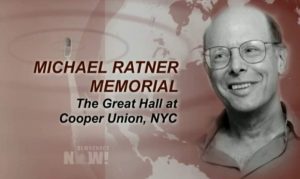
¡Michael Ratner Presente!
We hear excerpts from Michael Ratner’s public memorial held in the Great Hall at Cooper Union in Manhattan, New York. It would have been Michael’s 73rd birthday on June 13, 2016.


¡Michael Ratner Presente! was co-sponsored by Cooper Union, the Center for Constitutional Rights, Democracy Now!, National Lawyers Guild, The Nation Institute, Nation Magazine, Haymarket Books, and Voices of a People’s History of the United States.
Michael Ratner’s Politics – By Michael Smith
—————————————————————————–
CIA Sponsored Terror, Civil Liberties, Criminalizing Dissent, Extraordinary Rendition, Guantanamo, Human Rights, Political Prisoner, Prison Industry, Surveillance, Torture, Truth to Power, War Resister
Podcast: Play in new window | Download
Updates:
——
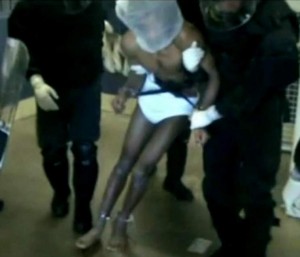
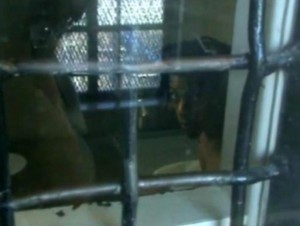
The Dallas 6: Abuse In Solitary Confinement
In April of 2010, a group of inmates locked in solitary confinement at SCI Dallas prison in Pennsylvania were suffering so much abuse and brutal treatment by prison guards they had placed their bedding over the window of their cell doors to attract attention of the prison administrators. Instead of receiving assistance, the inmates were brought up on riot charges. Last December the inmates known as the Dallas 6 defended themselves and presented testimony describing the details of their abuse in solitary confinement.
Shandre Delaney:
- This case, the Dallas 6, began in April 2010. These men were all in the RHU at SCI Dallas, in Dallas PA.
- The RHU is the restrictive housing unit, its an acronym for solitary confinement.
- All of these men had been victims of abuse and torture during their stay in solitary confinement.
- The Dallas 6 are Andre Jacobs, Anthony Kelly, Anthony Locke, Dwayne Peters, Derek Stanley and my son Carrington Keys.
- Most of these guys went into solitary for minor infractions, maybe to stay 60-90 days. My son stayed in there for 10 years, and I think all of the other guys about the same.
- These guys were jailhouse lawyers. These guys were people who spoke up and sent word to the outside about what was going on in solitary confinement.
- Once you do that – they call it misconduct, which are write ups, they’ll give you false write ups, and all types of things just to keep you in there longer.
- The cells are 6X9. In solitary, they might have a window to the outside. There is a bunk that they sleep on. There is only a slot for food to come in and out.
- You’re supposed to come out of your cell for one hour a day. They may get a shower 2 or 3 times a week.
- They lied to me for years and told me he wasn’t allowed visits. I later found out that they’re allowed one visit per month.
- The group that I work for Human Rights Coalition, some of the information that was sent from SCI Dallas, a 93 page report was written called Resistance and Retaliation.
- They sent a copy back in (to SCI Dallas) they didn’t mark out the guys’ names, so once the guards got a hold of this, and saw the guy’s names, they started one by one beating guys.
- They took one guy and put him in a restraint chair. You’re only supposed to be in the restraint chair for 2 hours, they kept there over night.
- They (the guards) told the guys (Dallas 6) we’re comin for you. In order to bring attention from a lieutenant or a superior officer, you have to cover your cell window.
- They covered their cell windows. The guards put on riot gear and one by one they beat these guys very bad.
- It’s all on video tape. They tasered a lot of the guys on their genitals.
- They have you like a hog or something, I saw it on the video.
- They cut their clothes off and left them for hours in cages.
- May 5, 2014 is supposed to be the official trial date. The official trial date has been going on for 2 years.
- I was praying every night hoping the phone didn’t ring and they tell me they killed him.
- They took out to shower and threw him down the steps and broke his nose, they busted his teeth out with a stick before.
- They put glass in his food.
- HRCoalition.org
- Dallas 6 Blog
- Petition to Indict Luzerne County Officials
- Summary in Support of Petition to Indict
Guest – Shandre Delaney, a powerful activist with HRCoalition and the mother of Carrington Keys, one of the Dallas 6.
—–
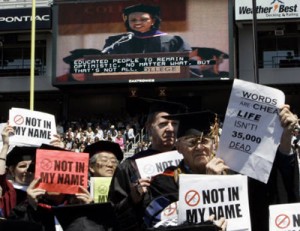

Rutgers University Plans to Give Condoleezza Rice Honorary Degree
Students and faculty at Rutgers University have rejected the idea to invite former Secretary of State Condoleezza Rice to speak at this year’s commencement ceremony and receive an honorary degree. The Board of Governors in February of this year unanimously voted to award Rice the invite for a fee of 35 thousand dollars. They also voted to give the national security adviser under former President George W. Bush an honorary degree. Resolutions signed by the university faculty and staff calls for Rice to be disinvited.
Professor Deepa Kumar:
- Historically our process at Rutgers University has involved having 20 some faculties, students, involved in the process of selecting the commencement speaker, typically by canvasing students and canvasing faculty and then making a recommendation to the president as to who to invite.
- When president Barchi came to your university in 2012 he completely violated this open and democratic process, formed a committee of 6 people including himself. Then they decided to go ahead an invite Condoleezza Rice.
- We believe that this was actually politically motivated. What suspect is that Chris Cristi who was riding high at that time in 2012, before bridge-gate, very likely wanted to have Condoleezza Rice as Vice Presidential candidate when he runs.
- So far we have taken out a petition drive, the students have their own petition drive, hundreds of people have signed up. We’ve also talked about holding a protest outside should our efforts fail.
- The last time Dr. Rice was invited to be a commencement speaker was at 2006 at Boston College, when everybody turned their back to her when she started to speak.
- Condoleezza Rice was very much a part of the systematic lying to the American public and quite frankly we at Rutgers teach our students to ethical to be responsible citizens.
- At Rutgers we have a 44 percent minority student enrollment. It’s a very diverse school and I welcome African American women as commencement speakers but I think there are better people like Anita Hill or Angela Davis.
- In 2002 we know from a Senate Committee Intelligence Report of 2009 that when Rice was chair of the National Security Council she gave a verbal approval to then CIA director George Tenet to go ahead and use enhanced interrogation techniques.
- She’s been quite steadfast in defending the use of torture. She gave a speech at Stanford University where she argued that if torture is authorized by the president then it doesn’t violate the Geneva Convention against torture.
- Commencement at Rutgers – May 18, 2014.
- Senator Feinstein called the use of torture a dark chapter in the history of this country.
- Clearly torture is a violation of international law and the Geneva Convention and I think to confer a Doctor of Law degree to someone who has been intimately connected with this “dark chapter” in our history I think is a serious embarrassment for Rutgers University.
- I’m really proud to be among the hundreds of faculty members and students who are actually standing up against this to disinvite her.
- Dick Cheney comes out and defends the torture program even now.
- If I Was Allowed To Speak
Guest – Deepa Kumar, an Associate Professor of Media and Middle Eastern Studies at Rutgers University. Her latest book is Islamophobia and The Politics of Empire by Haymarket Books and is in response to the events of 9/11, the Bush administration launched a “war on terror,” ushering in an era of anti-Muslim racism, or Islamophobia. Her first book, Outside the Box: Corporate Media, Globalization and the UPS Strike (University of Illinois Press, 2007), is about the power of collective struggle in effectively challenging the priorities of neoliberalism.
———————————————————————–
Help Support Law and Disorder Right Here

Law and Disorder is now a sponsored project of Fractured Atlas, a non-profit arts service organization. Contributions for the charitable purposes of Law and Disorder must be made payable to Fractured Atlas only and are tax-deductible to the extent permitted by law.
Civil Liberties, Criminalizing Dissent, Extraordinary Rendition, FBI Intrusion, Guantanamo, Habeas Corpus, Human Rights, Political Prisoner, Prison Industry, Supreme Court, Surveillance, Targeting Muslims, Torture, Truth to Power, War Resister
Podcast: Play in new window | Download
Updates:
- Judge Leon Rules That NSA Meta Data Collection Is Likely Unconstitutional.
- Michael Ratner: It Could Be The Deathknell For This Kind Of MetaData Collection
- Ed Snowden’s Response To Judge Leon’s Decision
- Ed Snowden’s Open Letter To The People Of Brasil
- A Christmas Card From Chelsea Manning
- Guantánamo Five: Military Commissions – Their Torture Memories Are . . Classified.
- First Commander Lenhardt: Guantánamo Should Never Have Opened
- American Studies Association Supports Boycott Of Israeli Academic Institutions
——


Over Policing of America: The Criminalization of Everyday Life
In his recent article titled Over Policing of America, attorney Chase Madar outlines a familiar narrative such as the militarization of police, stop and frisk, and how students get swept into the school to prison pipeline. The pattern is clear and who benefits is obvious in the list of over policing examples compiled by our returning guest, such as criminalizing immigration and how simple economic transactions are closely scrutinized by under-cover police.
Attorney Chase Madar:
- I’m hoping this new term will enter the national lingo; over-policing.
- What I wrote about is how the police paradigm has entered the DNA of social policy across the board in the United States in matters that a generation ago would not require police or prosecutors or criminal law, now suddenly do.
- That’s in education, in immigration, in family law, even how we regulate the economy.
- All of these spheres, domains of everyday life are increasingly regulated by police and prosecutors.
- A creeping police state. We need to take a very sobering look at how we’re governing ourselves and how criminal law is displacing and devouring all other kinds of social regulation.
- You see this more and more disciplinary matters in schools get outsourced to police departments.
- Police people are trained to respond to crimes, and to respond to everything as a crime. That’s the nature of police.
- When you send police into a school, the crime is going to sky rocket.
- Even the way we regulate our economy is suffering from an overdose of criminal law and police powers.
- What we have frequently is white collar work getting criminalized by a mare’s nest of criminal laws that are very complex, very difficult to understand.
- It’s not like we have a great financial system that was abused by a few bad apples. We have a really crappy system that’s legal because these people write the laws.
- Immigration law was mostly under the domain of administrative law with milder penalties, civil penalties.
- We’re kidding ourselves if we pretend that’s somehow aberrational.
- Although our political class seems incapable of doing anything constructive about it, they are very adept at channeling all fears about security in any sense into criminal law crack downs and ratcheting up the police state.
- Our incarceration rate is three times higher than the old East Germany.
- I think we need to switch very swiftly to alternative ways of social policy in holding our society together other than throwing cops and prosecutors at it.
Guest – Attorney Chase Madar , a TomDispatch regular and author of a new book, The Passion of Bradley Manning (OR Books). Madar tweets @ChMadar. He’s a contributor to the London Review of Books and Le Monde diplomatique and the author of a new book, The Passion of Bradley Manning (OR Books).
——————————————————-
Books From Law and Disorder Hosts
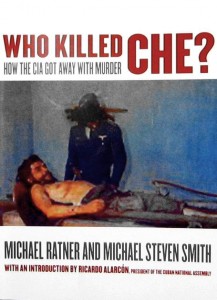
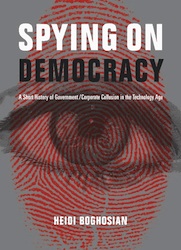

Afghanistan War, CIA Sponsored Terror, Civil Liberties, Criminalizing Dissent, Extraordinary Rendition, FBI Intrusion, Habeas Corpus, Human Rights, Military Tribunal, Political Prisoner, Prison Industry, Surveillance, Targeting Muslims, Torture, Truth to Power, War Resister
Podcast: Play in new window | Download
Updates:
- Michael Ratner: Bradley Manning’s Defense Makes Case To Dismiss Aiding The Enemy Charge
- Freedom of the Press Foundation For Transcripts
- Update: Judge Upholds Aiding The Enemy Charge in Bradley Manning Trial
—
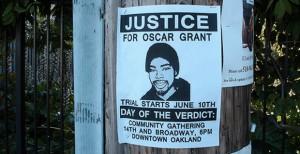
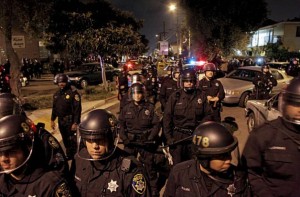
NLG Obtains $1.17M, OPD Reforms for Occupy Oakland Protesters and Journalists
In recent weeks, attorneys from the National Lawyers Guild achieved two significant victories for the rights of protesters faced with police brutality and unlawful repression. The first came when the city of Oakland settled a class action lawsuit for more than 1 million dollars. The second victory occurred in early July when Oakland City Council approved a settlement for 1.17 million in another lawsuit arising from police actions at protests. As part of these settlements, the Oakland Police Department is now legally obligated to follow a crowd control policy. This policy which already existed but lacked enforcement outlines limits on police department officer’s use of force and the ability to make mass arrests in protest situations.
Attorney Rachel Lederman:
- The first case has to do with the demonstration that had occurred on the day Johannes Mesterly was sentenced for the death of Oscar Grant. That’s the BART officer who shot Oscar Grant in the back as he was restrained facedown on the subway platform.
- There’s a movie out about the last day in the life of Oscar Grant called Fruitvale Station that I would highly recommend seeing it’s playing all over the country now.
- The death of Oscar Grant sparked a large number of demonstrations. November 5, 2010 was the date that Mesterly was sentenced and he was given a very minimal sentence of involuntary man slaughter of 2 years, 11 months with time served.
- There was a demonstration planned for that evening it was actually a very small demonstration. OPD had planned to not allow a march after dark.
- There was a rally that was permitted in downtown Oakland and then about 200 people started marching in the direction of Fruitvale Bart where the shooting had occurred. As soon as the march started the police began to set up for mass arrest.
- When a police line would be erected in front of the march people would naturally turn another direction. This went on for a while, where the march was re-routed.
- Eventually the OPD herded people to a residential area where they didn’t intend to go. The police announced it was a crime scene and began arresting everyone.
- The Oakland City Police have been under consent decree since January 2003 mandating reform process.
- We’ve had this crowd control policy in place but basically every single provision of the crowd control policy was violated in the Occupy Oakland incident and the Oscar Grant incident.
- We brought those cases to try to enforce the crowd control policy. A lot has changed in the last six months.
- There’s also been a new shake up of command (OCP) there’s a new acting chief.
Guest – Rachel Lederman, a California based National Lawyers Guild attorney who worked on both cases. Rachel first got involved in police misconduct civil rights cases as a result of her criminal defense work with political demonstrators. In 1989, Dennis Cunningham and Rachel Lederman successfully sued the San Francisco Police to obtain justice for AIDS activists who had been brutalized and unlawfully detained in what became known as the “Castro Sweep”.
—–


Surveillance Blowback: The Making of the U.S. Surveillance State, 1898-2020
What is the history and context of surveillance in the United States? Last week Scott Horton explained how the Foreign Intelligence Surveillance Act court devolved into a panel of judges making decisions in secret that influence federal law. Returning guest Alfred McCoy traces the US surveillance apparatus back to the late 1800s and brings us up to understanding the context of leaked NSA documents by whistle-blower Ed Snowden. In his latest article titled Surveillance Blowback: the Making of the U.S. Surveillance State 1898-2020, Al McCoy, Professor of History at the University of Wisconsin-Madison details the surveillance timeline beginning with the US occupation of the Philipines and makes the connection to US imperialism abroad and apathy at home.
Professor Alfred McCoy:
- Four years ago I published a book called Policing America’s Empire which started in the Philipines and started the history of US domestic surveillance through what I call surveillance blowback.
- It’s the trajectory of history that allows you to see this.
- In the late 19th century America had what I call our first information regime which was really a brilliant synergy of discoveries.
- Thomas Edison’s quadruplex telegraph, Remington’s typewriter allowed the transmission around the world, across the nation, absolutely accurately at 40 words a minute.
- The Gamewell Corporation for a half century during the 19th century was the world leader in the development of police telegraph and telephone communication – those police boxes that used to be on the streets of every American city.
- The Gamewell Corporation had 900 of these boxes in operation and collectively they sent 41 million messages in the year 1900.
- When we intervened in the Philippines we were suddenly faced with this massive insurgency, this guerrilla underground. We smashed the regular military formations but we couldn’t break the insurgency.
- The US military in order to pacify that country created the first field intelligence unit in its 100 year history.
- They appointed an obscure medical doctor Captain Ralph Van Deman to be the head of the division of military information.
- He decided he would map the entire Filipino political elite.
- William Howard Taft passed very draconian sedition and libel legislation and created a powerful colonial secret police called the Philipines constabulary. It took about 10 years to accomplish. 1898-1907
- We had to track down the politicians (Philipines) we had to manipulate them.
- 10 years after that process, the US joined WWI. April 1917.
- The United States was the only army on either side of the battlefield that didn’t have an intelligence service with any description.
- We turn now to Colonel Van Deman who applied his Philippines experience to developing a very elaborate counter-intelligence apparatus inside the United States.
- Mr and Mrs Van Deman ran a private intelligence service that had Army file clerks and regular FBI liason officers dropping by.
- And from their home they compiled files on 250 thousand suspected subversives.
- They divided the world. Basically, North America, Latin America became the purview of the FBI for counter-intelligence the rest of the world became purview of US military intelligence and of course the CIA and then NSA.
- That division of the word remain in effect until December 2011.
- 3 million Afghani iris scans and fingerprints are housed in a main frame computer in West Virginia.
- So, we developed then, this very efficient system of surveillance and digital monitoring overseas.
- During the war on terror we now know the Bush Administration beginning October 2001 authorized the NSA to start massive capping of all digital communications.
- In March of this year, it was 97 billion emails that were tapped by the NSA.
- This began migrating home very very quickly.
- When Obama came even though he criticized this illegal wiretapping, when he came in, instead of cutting it back like the Republicans did in the 1920s, he decided to build upon it.
- What he’s building upon it for is to build an architecture for the exercise of global power through a significant edge or advantage for information control and information warfare.
- Obama wants to cut back on the appropriations for the big behemoths, the heavy tanks, the big ships and he wants to shift us into an agile form of information warfare and global information control.
- The NSA is spending 1. 6 Billion dollars for the world’s biggest data farm in Bluffdale, Utah.
- The National Geo-spatial Intelligence Agency has a nearly 2 billion dollar headquarters with 16 thousand employees in DC.
- The Obama Administration has launched a new generation of light low cost, very agile satellites that can be remotely controlled from the ground, serving ground force commanders.
- The Obama Administration is also building an armada of 99 Global Hawk drones with 24 hour flight capacity. These are surveillance drones with a 100 mile ambit for sucking audio communications.
- With the combination of drones sucking up the local two way radio – cell phone communication with the tapping of the fiber optic cables within the US by the NSA, and internationally by the Five Eyes Coalition, Canad Australia, New Zealand and Britain, means that the NSA will have a total global surveillance system for the first time in human history.
Guest – Alfred McCoy, Professor of History at the University of Wisconsin-Madison. His recent book, Policing America’s Empire: The United States, the Philippines, and the Rise of the Surveillance State (2009), draws together these two strands in his research–covert operations and Philippine political history–to explore the role of police, information, and scandal in the shaping both the modern Philippine state and the U.S. internal security apparatus. In 2011, the Association for Asian Studies awarded Policing America’s Empire the George McT. Kahin Prize, describing the work as “a passionate, elegantly written book.” He’s also the author of “Torture and Impunity: The U.S. Doctrine of Coercive Interrogation.” Al is also the author of “A Question of Torture: CIA Interrogation, From the Cold War to the War on Terror” and “The Politics of Heroin: CIA Complicity in the Global Drug Trade. The first edition of his book, published in 1972 as The Politics of Heroin in Southeast Asia, sparked controversy, but is now regarded as the “classic work” about Asian drug trafficking.
—————————————————

























